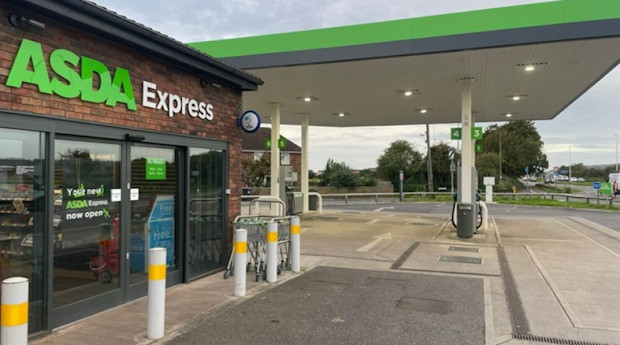Asda revealed today that it has completed the acquisition of EG Group’s UK business, five months after announcing the £2.1bn deal aimed at accelerating its growth in the convenience and foodservice channels.
The group’s plan is to create a “value-led convenience offer” by rolling out its new Asda Express format across EG’s 356 UK sites, with a pledge to bring down prices of groceries and fuel across the estate.
This transaction builds on Asda’s acquisition of 119 forecourt sites from the Co-op, which started to convert to the Asda Express fascia earlier this month, and the launch of three standalone Asda Express convenience stores since October last year.

The EG and Co-op acquisitions, plus the three Asda Express stores currently open, will give Asda 478 convenience stores, with plans to open a further 300 standalone c-stores by the end of 2026. This is in addition to its existing estate of 580 supermarkets and 31 Asda Living stores, as well as 321 of its own petrol forecourts.
Mohsin Issa, co-owner of Asda and the EG Group, said: “This is a great day for Asda and for millions of UK consumers. Asda is a much-loved brand that is instantly recognised for great value. I could not be more proud or excited that the iconic Asda sign is now coming to hundreds more communities.”
Asda has stated that its ambitious plans for the convenience sector are part of its long-term strategy to overtake Sainsbury’s to become the UK’s second-largest supermarket operator.
The EG acquisition also accelerates Asda’s move into the £62bn foodservice market, with the transfer of 462 Greggs, Burger King and Subway outlets as franchise agreements. Asda also now wholly owns healthier fast-food chain Leon, with plans to introduce the brand to its stores.
Lord Stuart Rose, Chairman of Asda, commented: “The combination of Asda and EG UK will only create more opportunities for Asda to bring its focus on value to even more communities – as well as driving the sustainable growth of the business through a convenience offer of genuine scale and substance.”
Issa added: “With the deal complete, we can focus on delivering the growth opportunities. That means lowering the price of fuel for more motorists, bringing Asda’s great value and quality to more communities, offering greater opportunities to our supplier partners and creating sustainable job opportunities for colleagues in our stores and depots.”
Meanwhile, Gary Lindsay, Managing Partner at Asda’s co-owner TDR Capital, said: “This transaction is all about growth – and bringing together the complementary strengths of Asda and EG UK. We are creating an enhanced and more diverse Asda business that delivers even greater value for its customers on a daily basis in stores and online.
“Becoming the number two UK supermarket again and delivering a stronger and more compelling proposition for UK consumers are the metrics we will judge the success of this transaction by.”
Asda noted that it expects the deal to generate over £250m of incremental EBITDA on an annualised basis post synergies within the first two years. Synergies will mainly arise through economies of scale of the combined entity, higher volumes and cross-selling opportunities.
Lord Rose will continue in his role as Chairman of the combined business alongside Dame Alison Carnwath as Non-Executive Director, as well as Issa and Lindsay as Directors of the combined business. The group added that it was continuing its search for a permanent Chief Executive.
NAM Implications:
- Sainsbury’s will not easily surrender the No. 2 slot.
- i.e. anticipate retaliation.
- The move into foodservice will also be disruptive…
- However, a key point is the promise to reduce the price of fuel could upset the delicate supermarket price balance.
- i.e. encouraging price cutting where little existed.
- Watch these spaces, it will be interesting…



